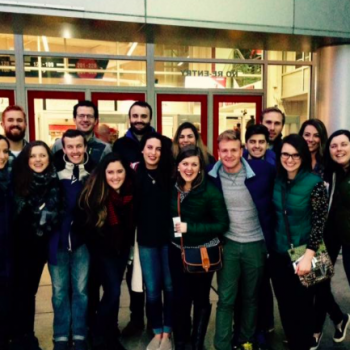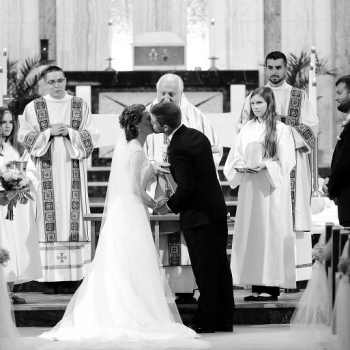Hugh Hefner died last week.
As a Catholic, it’s tough to know the right way to respond to his death. A lot of Catholic figures suggested we should pray that he repented and recognized Christ before he died. This is probably the right idea.
After drinking a pot of coffee around 7PM last night for no good reason in particular, I found myself still awake and staring wide-eyed at my computer at 3AM—which is when I came across a 2015 Cosmopolitan article from an interview with Holly Madison, one of Hefner’s (more recent) Playboy girlfriends.
Madison described how depressed she became after Hefner forcibly cut her off from the outside world, required she engage in sex with him and other women in the house, and inflicted emotional abuse that manipulated her into consenting to all of the above. Sadly, one could’ve guessed that this was what’s going on behind the doors of Playboy mansion. It’s a phenomenon that’s contributed to the twisted way we look at sex—and also at women in general.
I often think of something Jason Evert says about the beauty of the female gender:
“The woman is the most beautiful thing on Earth. I’m not pandering to you—this is obvious. What do guys get addicted to looking at on the internet? Like, flamingos or something? Waterfalls? It’s the beauty of the woman! If creation was a symphony, she is the crescendo, and this is how it’s presented in the book of Genesis—God creates the stars and the moons and the bugs and the birds and the mammals and then man, and then woman. And when Adam sees her, he is beside himself. “Alas! This one is flesh of my flesh and bone of my bone.” He is captivated by her. He is in awe.”
What could possibly be more special than this? Not to say men aren’t special—like, you guys are fine—but this is super special. It’s so inherently good to be a woman. I look so warmly on all that comes with it—the upsides and the downsides, monthly gifts notwithstanding. Truly, womanhood is such a blessing. It’s so, so good to be woman.
John Paul II’s Theology of the Body further emphasizes this point. Women have an incredible capacity for vulnerability, adversity, pain—and also for love. Our bodies were perfectly made for bearing and rearing children, even down to the tiniest details, like the bend of our arms and the curve of our hips. We’re an incredibly strong, resilient gender from the moment we’re conceived in the womb. Women are amazing.
Our Mother was the ultimate woman. Her example set the standard for femininity in a graceful, beautiful way. Blogger Matt Foley expressed this remarkably:
“We don’t hear much from Our Lady in the Scriptures, but we do hear in Luke’s Gospel that she “kept all of these things in her heart.” Mary had a lot to deal with. The Lord of the Universe came to her and promised her the life she was born to live, and then she knew He would have to take it away. And she had to just wait for that. There was so much back and forth, up and down, waiting and going. And she knew deep in her heart, that on this side of Heaven, for three long and terrible days, it would all end in heartbreak. But every sorrow, every joy, every love, everything, she kept in the depths of her heart and shared it with her first and deepest Love. It was there she found the meaning of her womanhood. It was there she was affirmed in the fullness of her identity as a woman. So when God came and asked her, “Mary, my daughter, I love you. Are you ready?” Her answer was yes. She already knew her worth and her purpose was rooted in Goodness. She knew she was loved and lovable. Her answer was openness to receive the gift of God. And because of that, the world was never the same.”
But if women are profoundly capable of all of these things—vulnerability, resilience, receptivity to love, etc. etc.—we’re all the more profoundly capable in our ability to draw greatness out of man. This is what we were created for—to compliment and accentuate the parts of man that perfectly reflect his creation in the image and likeness of God.
Peter Kreeft said it best:
”The heart is like a woman, and the head is like a man, and although man is the head of woman, woman is the heart of man and she turns man’s head because she turns his heart.”
My sister delves deeper into this point in a beautiful critique of the Women’s March (which you can read here):
“Women, we are the heart! We are the heart of this world, with the ability to turn its head. Women, we were not created to be trampled on or used. We are not secondary or lesser to our male counterparts. We were created with feminine qualities including gentleness, warmth, sensitivity, compassion, and receptivity. Yes, we’re intelligent, capable, and driven. We are strong and brave (shout out to Leah Darrow). We are not a slave to our fellow man, but rather a fundamental, necessary, and worthy companion. The gifts and talents that we have to offer are good, holy and beautiful. We are nurturing, loving, protective, loyal, self-giving, and communicative by nature. These qualities are of great service to our world. They are valuable in the workplace, just as they are essential to the family. It is by harnessing these very qualities that we will be be most impactful in the world, whether as business women, entrepreneurs, politicians, journalists, doctors and/or nurses, but of utmost importance as mothers.”
We were not created to be trampled on or used. We are not secondary or lesser. We are not a slave to our fellow man. In this thought, we’re brought back to “fellow man”, Hugh Hefner.
His contributions to the twisted way the world now sees women are neither here nor there, in my opinion. It would’ve happened one way or the other, as it has countless times over in other civilizations and will continue to until the end of time. One of the devil’s greatest weapons is the perversion of the beauty of womanhood and the relationship between the sexes, because the toxicity of its outcome seeps into every other area of life. In modern times, we see this everywhere.
The perversion of woman—who she is, what she does, how she’s meant to relate to man—has brought forth social repercussions we could list for days. And it hardly leans in one direction. The woman who demonizes the male gender and aims to squeeze women into the role that’s meant for men does as much damage to herself as the one who exploits her sexuality in an attempt to harness power and control. I hurt for these women. I hurt for the Holly Madisons of the world, who suffer from a fundamental misunderstanding of who they are and what they’re capable of.
But within this context, it must be said: the Hugh Hefners suffer too.
Men need good women, just as women need good men. You can’t have one without the other. So as Holly Madison likely suffers from her disconnection with her purpose, Hugh Hefner likely suffered also. A man who uses and abuses women the way he did strikingly misses out on his own potential for greatness. This is a travesty too.
To be 25, Catholic, and a woman is a profound gift, but it’s also an incredible challenge. Women bear a responsibility to the men in their lives to hold a certain standard, but it’s a responsibility that does not come without its share of risk. 20-something single, Catholic women today enter into a remarkable vulnerability in choosing to maintain that standard. In a world where most women consent to their own mistreatment and the perversion of their beauty, man’s obligation to the standard isn’t an obligation at all—it’s a choice. As a result, the women who expect more often find themselves at the receiving end of profound rejection. It’s that pain and adversity I mentioned before—it’s real and it’s common.
But there’s good news: it’s worth the graces of calling men to their higher purpose. The cross of rejection is worthy of the great fruits that stem from fulfilling our call as females to draw the greatness out of men. But just as we have the call, we also have the tools. Our remarkable resilience gives us the ability to endure it.












